- Home
- Chris Ryan
The One That Got Away - Junior edition Page 4
The One That Got Away - Junior edition Read online
Page 4
While the noise of the Chinook’s engines still covered us, the guys with machine guns snapped their belted magazines into place. Then in a few more seconds the heli lifted away into the night and was gone.
For the last couple of hours we’d been in deafening noise. Now suddenly we were thrown into silence. The air was still, the night clear. We lay facing outwards in a circle on the desert floor. Dogs barked not far off to the east. They’d heard us, even if nobody else had.
With our goggles off, we had a good view of our surroundings. We’d landed in the middle of a dry wadi maybe 200 metres wide. Scattered clouds were sailing across the moon, and in the clear intervals its light was very bright. Too bright. As our eyes adjusted, we could see that the wadi had walls five or ten metres high, apparently with a level plain above them on either side.
The main supply route was somewhere up ahead of us, to the north, running roughly east to west. The ground beneath us was dead flat, and consisted of hard-baked clay, but we found we were lying right between a set of tracks made by a vehicle whose tyres had sunk into the dry mud. I realized that the mud was only a few centimetres deep, and that under it lay solid rock. There was no loose material with which to fill our sandbags.
I reckoned that if any Iraqis had seen the chopper, they’d already be running or driving across the flats towards the lip of the wadi. I had visions of people coming from all directions and suddenly appearing on the rim, against the stars.
‘Let’s get some guns onto the high ground,’ I whispered to Andy. So we sent out two lads, one on either side, to go up the wadi walls and keep a lookout.
Gradually the barking of dogs died away and left us in total silence. Our most urgent need was to get our kit out of sight. We began dragging it into the shadow of the moonlight cast by the right-hand or eastern wall. From the middle of the wadi that shadow looked solid and deep – a good place in which to hide. But when we reached it, we found it was an illusion. There was no cover of any kind, and in the daylight the whole river bed would be dangerously open.
In heaving and dragging our kit, we were leaving marks in the baked mud of the wadi floor. But we had a much bigger problem than that. There was hardly a grain of sand in the whole area. We were on bedrock. Training in the dunes of the Gulf, we had built beautiful OPs with the greatest of ease, digging into the sand and filling as many bags as we needed. Here, without sand, our bags were useless.
We needed to find out exactly where we were. So Mark got out a GPS unit and plotted our position to within a few metres. Then we pulled in our two flanking guys, who reported that the desert on either side of the wadi ran away level in flat plains, without a stitch of cover.
Andy went forward with Mark to recce the ground ahead. As the rest of us lay waiting for them to return, we began to realize how cold it was. The wind bit through our DPMs and smocks, which were far too light for the job, in both weight and colour. They gave very little protection against the cold, and were such a pale sandy colour that they shone like beacons in the moonlight – my builder had been right! Way down at Victor, several hundred miles further south, the nights had been warm and the days hot enough to make us sweat. Nobody had thought to warn us that things would be different up here.
The dogs started barking again. It was hard to tell what had set them off this time. Could they hear us, or was our scent carrying on the wind? We reckoned they were no more than 400 or 500 metres away. That figured, because the satellite photos had shown irrigated fields and habitations within about that distance of our drop-off point. We just hoped they didn’t come across to suss out what was disturbing them.
In twenty minutes Andy and Mark were back. ‘Right,’ Andy whispered. ‘We’ll head up here. Get forward up the wadi.’
Four of the guys struggled into their bergens and walked forward about 300 metres, then went to ground. As soon as they were settled, the rest of us moved up to join them. Then the first four went back and picked up the rest of their kit, including the jerry cans, which were tied together in pairs with tape. Once they’d joined us, we went back, and so it continued for most of the night: shuttling forward, back, forward, back. It was tiring work.
By 0500 we had moved about two kilometres to the north, and were in the area selected for the OP. The sky in the east was already beginning to lighten. We were still in the wadi, but we couldn’t stay where we were, because the ground was far too open, and the walls were bare rock, so there was no chance of digging. Then Andy went on round a corner with Stan and found that the wadi came to a dead end in a cul-de-sac no bigger than a good-sized room. The walls were fairly steep, but on the left-hand side, as we faced north, one massive slab of rock had fallen off the side of the ravine. The detached lump was about two metres high, and lay a metre or so clear of the wall, with a second, smaller rock near its foot. It made some natural shelter. A little further to the south there was an overhang going back under the wall. The floor was of hard-baked clay, with loose rocks and some stunted thorn bushes scattered about.
It wasn’t a great hiding place, but it was the best we could find.
We went into our hiding place and packed away all the kit for the OP, because it was no use to us in this rock desert. We put the jerry cans at the bottom, with the thermal sheets, cam nets and empty sandbags on top, to deaden any noise. Some of us sat on the cans, a couple of us tucked in underneath the overhang, and the rest settled around the rocks at various places. If we wanted to shift about, we went at a crouch or on hands and knees, but all movement was kept to a minimum.
The end of the wadi covered us from the north – the direction of the main supply route – and we were quite well protected by the sides. But to our rear we were dangerously exposed. If anyone came up the river bed, following our tracks, they’d be bound to walk or drive right on top of us.
‘This is no good,’ somebody muttered. ‘If it looks bad in the daylight, we’ll have to consider getting on the phone so we can be relocated.’
Before dawn, we put out two claymore mines, about fifty metres down the wadi with wires running back to our position, so that we could blow up anybody who approached along the foot of the eastern wall.
At first light Andy and I crept carefully up a small channel and lay at the top of the bank for a look around. Daybreak revealed that flat, grey-brown plains stretched away into the distance to the east and west. But there, straight ahead, only a couple of hundred metres away, was the main supply route. It ran right and left across our front on a big embankment like a long ridge. To the left, one harmless-looking civilian truck was parked on the edge of the highway. It had an open back and slatted sides, as if it was used for carrying animals. One or two other lorries rumbled along the road.
On the high ground to our right, another couple of hundred metres away, was something much more sinister: an anti-aircraft position. Through our binoculars we could see the twin barrels of guns, which we identified from our manual as SA60s, poking up above the emplacement. There were at least two Iraqis moving about.
The sight gave us a nasty fright. Those guns could only be there to protect some installation from air attack. It meant we were right on the edge of an enemy position. We would have to be extremely careful.
We came back down and let the rest of the guys know that there were enemy within 400 metres of us. In the shelter of the wadi we heard the occasional vehicle go along the road, but we kept our heads down while we considered what to do. It was too dangerous to spend any length of time where we were. We had to get a message through to base, asking for a relocation or a return.
The trouble was, the 319 radio did not seem to be working. It should have been possible for us to communicate instantly with the base station in Cyprus, and from there messages should have been back in Al Jouf within a couple of minutes. But although Legs patiently tried different frequencies and experimented with various aerial arrays, he got no response. (We discovered much later that we’d been given the wrong frequencies.) For the moment there was no seriou
s worry, because we knew that as a fall-back we had the Lost Comms procedure. This meant that if we had not come on air within forty-eight hours, a helicopter would automatically return, either bringing us a new radio set or armed with a plan to shift us elsewhere.
We took turns to go on lookout duty, or ‘stag’, while the others had a meal or a sleep. We did an hour’s guard-duty each, holding the clackers for detonating the claymores and watching the wadi. The rest of the guys, having had a sleepless night, were glad to get their heads down. It was so cold that several of them struggled into their NBC suits and lay around in them. We were all more or less hidden, and there was a good chance that if we kept still, even a man looking up the wadi from a distance would not have seen us.
Then, late in the afternoon, we heard voices. A boy began calling out, and a man answered him. Peering cautiously over the western rim, we saw them driving a herd of goats. They were walking across the plain, nearly parallel to the wadi, but heading in towards us as they moved northwards, and calling the goats on as they went. The truck with slatted sides was still parked on the far side of the main supply route. It looked as if the goatherds had come out to check their flock, or were about to load the animals up.
Either way, they were too close for comfort. We grabbed our weapons and lay like stones, hardly breathing, each man with a round up the spout.
From the jingling of the goat bells and the voices, we reckoned the flock passed within fifty metres of our hiding place. As the sounds faded into the distance, we kept still, listening. Half an hour later, we crept to the top of the bank again to check what was happening: the truck had disappeared, and there was no sign of the goats. But where they had gone, we couldn’t tell.
This place was bad news. There was so much activity in the area that it could only be a matter of time before we were compromised.
There was still no response on the radio, and we began to grow nervous. We were also getting frozen. I had the best boots of anyone in the patrol, but even I had numb feet. Oddly enough, I didn’t feel hungry, and all I ate during the day was a bar of chocolate and a packet of biscuits.
As soon as it got dark, Andy, Mark, Stan and Dinger decided to take a look around.
‘We’ll leave in this direction,’ Andy briefed the rest of us in whispers, ‘and we’ll come back in the same way. The pass number’s the sum of nine.’
This meant that when they returned, one of us would state a number between one and eight. The correct response would be the number which, added to the original number, made nine. So, if we said ‘three’, they would have to reply ‘six’. In hindsight, this was a bit stupid. If anyone other than the patrol had approached us, it would have been an Iraqi, and just by speaking to them we would be immediately compromised.
‘We shouldn’t be more than three or four hours,’ Andy continued. ‘As we come in, the first man will walk down with his arms extended and his weapon held out sideways in his right hand.’
If the rest of us heard a contact, he went on, we were to stand-to, wait five or six minutes for the recce group to come through our position, and put fire down on anyone following them. If our own four guys didn’t appear, we were to make for the drop-off point, and they would join us there.
They left at 2300 while the rest of us took turns to do an hour’s stag. Not a sound broke the silence; the night was utterly still, but not nearly so light as the one before, because the sky was full of clouds.
The recce party returned safely at 0330. They had found that the main supply route was not a metalled road, but just a series of dirt tracks running parallel through the desert; the tracks spread out across nearly a kilometre. They’d also discovered a single white post standing in the ground, about 300 metres from the lying-up position, but they could not make out what it was marking. Then they’d checked out a little tented encampment beyond the spot on which the truck we’d seen had been parked. It was a second anti-aircraft position, with a few vehicles parked around it.
For what was left of the night they got their heads down, and the rest of us stagged on again. When morning came, we decided it was too dicey to stay. There were too many people about, and we were too close to the site that the anti-aircraft guns were guarding.
For the rest of the second day we tried to get through on the radio, but no luck. We also tried using our Satcom telephone. We didn’t want to speak for long on it, because any call that lasted more than twenty seconds could be picked up by direction-finding apparatus. So we switched the set to listening-wait, hoping to hear a call from base. Then occasionally we would come up on the call-sign with a quick request for a comms check: ‘Hello Zero Alpha, this is Bravo Two Zero, radio check, over.’ But nothing happened.
It looked as though we were going to have to rely on our Lost Comms procedure. That would mean pulling back down the wadi to the drop-off point, and being there when the chopper came in at midnight – forty-eight hours after dropping us off. We hoped that it would take us somewhere better, but more likely it would just bring us a new radio. Either way, after dark the whole patrol was going to move back, humping all our kit. We weren’t looking forward to making the effort.
It was about four o’clock in the afternoon that everything started to go wrong.
Once again we heard the herder boy calling his goats. This time he sounded closer, and coming directly towards us. I’d been talking to Andy and Dinger about the radio, and I was under the overhang when the boy started shouting, from a point directly above my head, but some way out behind me.
The three of us lay still, but when I looked across at Vince, on the other side of the rock, he was craning his head to see if he could spot the boy. Mouthing at him furiously, and giving tiny, frantic movements of our fingers, we tried to make him keep his head down.
If we’d all stayed still, we might have been OK. Nine times out of ten, if hidden people don’t move, they get away with it. What betrays them is shape, shadow, shine and, above all, movement. It’s the same with birds and animals in a wood: as long as they keep still, you don’t see them, but the instant one moves, that’s it.
But Vince moved. Wanting to see what was happening, he eased his head up until the boy could have caught sight of him.
The shouting stopped. There was no cry of alarm, but the sudden silence was ominous. It was pretty obvious that the boy had run off. I crawled round to Vince and hissed, ‘Did he see you?’
‘No, no, no,’ he answered. ‘We’re OK.’
I left it at that, but I didn’t believe him. Things were getting scary: we were about to be rumbled. I felt fear starting up in my stomach. Legs was still at the radio, trying to get through. ‘Have you been on the guard net?’ I asked him.
‘No.’
‘Well, get on it and start tapping Morse.’ The guard net sends out new frequencies, and can only be used in an emergency. This was one.
Legs started working out his Morse code message: High possibility compromise. Request relocation or expel. But just as he was tapping it in, we heard the roar of a heavy engine and the squealing and grinding of what we thought were tank-tracks, approaching up the wadi.
Wild thoughts raced through my mind: an anti-personnel round from a tank could destroy us all.
‘Get the sixty-sixes open,’ somebody shouted, and we pulled open the tubes and cocked the disposable rocket launchers. The guys had spread out round the end of the wadi, lying behind whatever cover they could find.
Every second the rattling noise of the tracks got louder. We were stuck, pinned like rats in the dead end of the ravine, just waiting for the tank to come round the corner. We couldn’t tell what else might also be coming at us over the flat ground above. The chances were that the Iraqis were deploying behind us too; even at that moment, they were probably advancing on our position. A couple of hand grenades tossed over the edge would make a nice mess of us. Even so, if the tank came into view and levelled its gun on us, we’d have no option but to run up onto the plain and chance it with the anti-aircraft
positions on the high ground.
By now it was 1700 hours, but still full daylight. We started drinking, because we knew that if we had to run for it in the desert, we’d need the liquid inside us. Other guys began frantically repacking their kit, pulling off the warm jackets they’d been wearing and stuffing them into their bergens. A couple of the lads struggled out of their NBC suits and stowed them.
I checked my 203 magazines again. Each could hold thirty rounds, but I’d only loaded them with twenty-eight, to leave the springs a bit looser and cut down the chance of a stoppage. The spares were in my left-hand lower pouch.
Then, suddenly, something did come round the corner.
Not a tank . . . but a yellow bulldozer.
The driver had the blade high up in front of him, obviously using it as a shield. We all kept still, lying or crouching in firing positions, but we knew the man had seen us. He was only 150 metres away when he stopped, stared, and reversed out of sight before trying to turn round. Obviously a local, he must have known that the wadi came to a dead end, and his only purpose in coming up it had been to find out who or what was in there. We held our breath as the screeching and crunching gradually died away.
For a minute or two we felt more relief than anything else. But we felt certain that the local militia must be deploying behind us, and we needed to get out of there. We’d already decided to ditch the surplus kit we couldn’t carry, but we stowed the 66s away, pulled our bergens on and were ready for the off. As we were about to leave, I called, ‘Get your shamags round your heads.’ So we all wrapped our heads in shawls, in case we could bluff our way and pass as Arab soldiers, even for a few minutes.
We started walking southwards, down the wadi, towards our emergency rendezvous point. Finding myself at the front, I led the patrol out, my 203 locked and loaded, ready for action. Andy was in the middle, the normal slot for a patrol commander. Dusk was already coming on, and I was hoping we could reach the drop-off point, less than two kilometres to the south, and put down enough fire to defend ourselves until dark. Then we’d have to wait until the chopper came in.

 Global Strike
Global Strike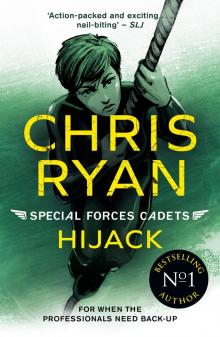 Hijack
Hijack Special Forces Cadets 2
Special Forces Cadets 2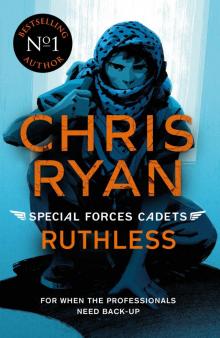 Ruthless
Ruthless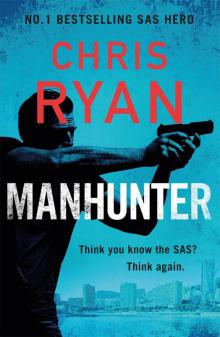 Manhunter
Manhunter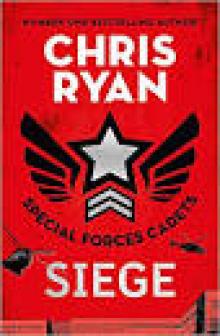 Special Forces Cadets 1
Special Forces Cadets 1 Red Strike
Red Strike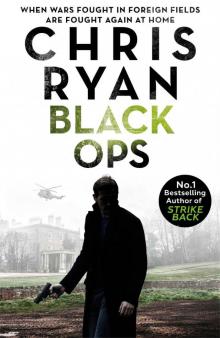 Black Ops
Black Ops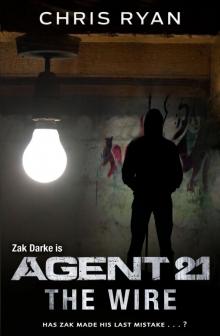 Agent 21: The Wire
Agent 21: The Wire Land of Fire
Land of Fire Alpha Force: Fault Line
Alpha Force: Fault Line Under Cover (Agent 21)
Under Cover (Agent 21)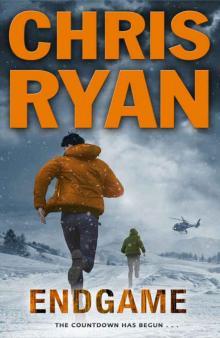 Endgame (Agent 21)
Endgame (Agent 21) Red Centre
Red Centre Blackout
Blackout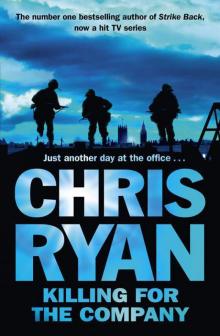 Killing for the Company
Killing for the Company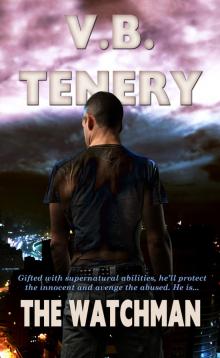 The Watchman
The Watchman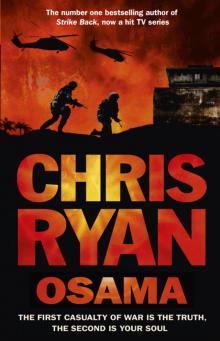 Osama
Osama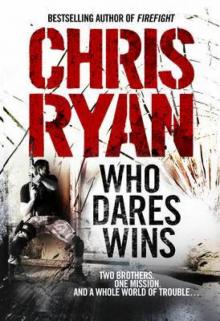 Who Dares Wins
Who Dares Wins The Kremlin Device
The Kremlin Device Hunter Killer
Hunter Killer Alpha Force: Untouchable
Alpha Force: Untouchable Stand By Stand By
Stand By Stand By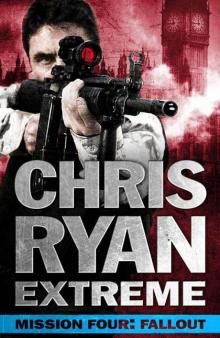 Chris Ryan Extreme: Hard Target: Mission Four: Fallout
Chris Ryan Extreme: Hard Target: Mission Four: Fallout Greed mb-1
Greed mb-1 Alpha Force: Desert Pursuit
Alpha Force: Desert Pursuit Strike Back
Strike Back Greed
Greed The Bay Bulls Standoff
The Bay Bulls Standoff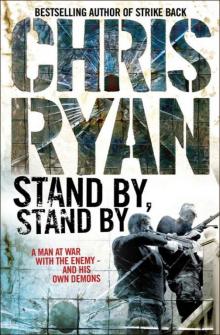 Stand By, Stand By gs-1
Stand By, Stand By gs-1 Outbreak
Outbreak Hunted
Hunted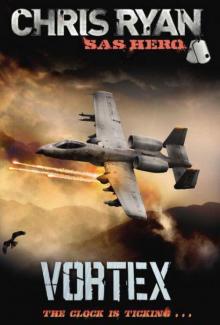 Vortex cr-4
Vortex cr-4 Rat-Catcher
Rat-Catcher Vortex
Vortex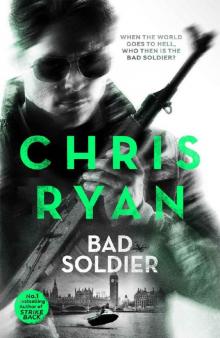 Bad Soldier
Bad Soldier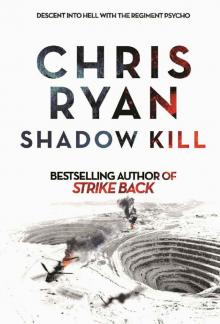 Shadow Kill: A Strikeback Novel
Shadow Kill: A Strikeback Novel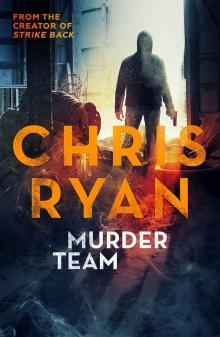 Murder Team (Kindle Single)
Murder Team (Kindle Single) One Good Turn
One Good Turn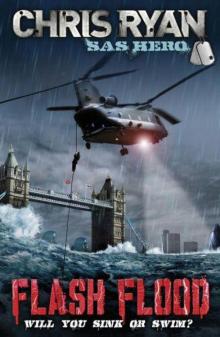 Flash Flood cr-1
Flash Flood cr-1 Night Strike
Night Strike Wildfire
Wildfire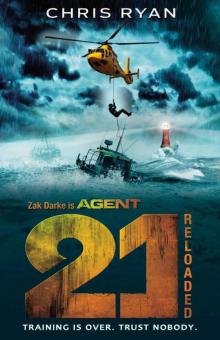 Agent 21: Reloaded: Book 2
Agent 21: Reloaded: Book 2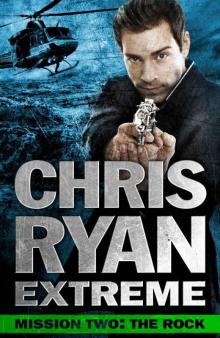 Chris Ryan Extreme: Hard Target: Mission Two: The Rock
Chris Ryan Extreme: Hard Target: Mission Two: The Rock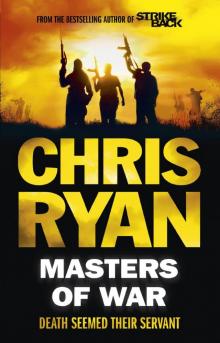 Masters of War
Masters of War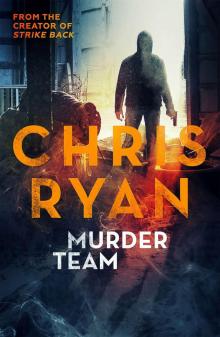 Murder Team
Murder Team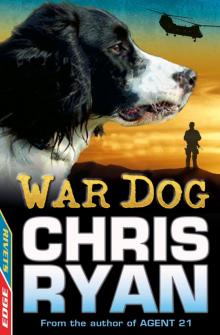 War Dog
War Dog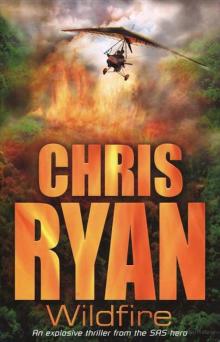 Wildfire cr-2
Wildfire cr-2 Survival
Survival The One That Got Away - Junior edition
The One That Got Away - Junior edition The Hit List
The Hit List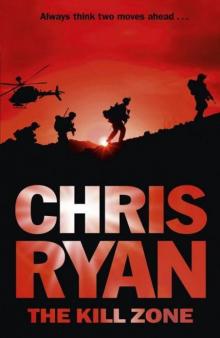 The Kill Zone
The Kill Zone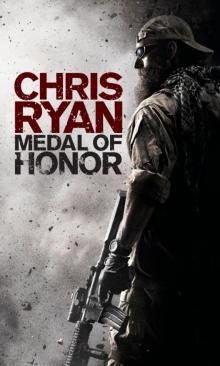 Medal of Honor
Medal of Honor Battleground
Battleground Twister
Twister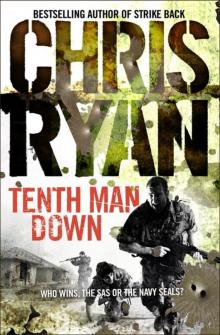 Tenth Man Down gs-4
Tenth Man Down gs-4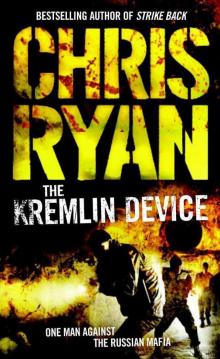 The Kremlin Device gs-3
The Kremlin Device gs-3 Hostage
Hostage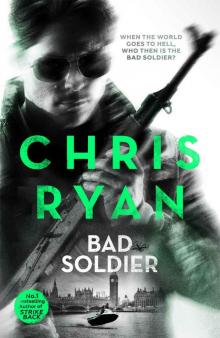 Bad Soldier: Danny Black Thriller 4
Bad Soldier: Danny Black Thriller 4 Alpha Force: Blood Money
Alpha Force: Blood Money Firefight
Firefight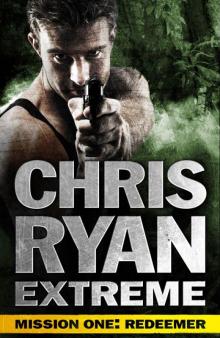 Chris Ryan Extreme: Hard Target: Mission One: Redeemer
Chris Ryan Extreme: Hard Target: Mission One: Redeemer Hit List
Hit List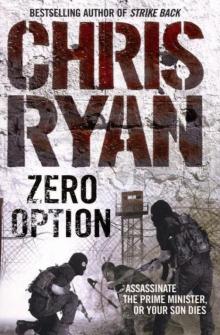 Zero Option gs-2
Zero Option gs-2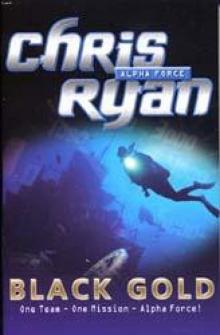 Black Gold
Black Gold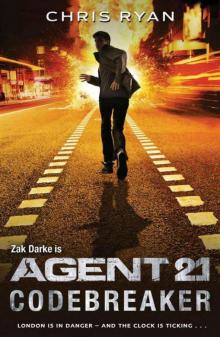 Agent 21: Codebreaker: Book 3
Agent 21: Codebreaker: Book 3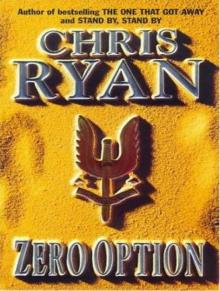 Zero Option
Zero Option Ultimate Weapon
Ultimate Weapon Tenth Man Down
Tenth Man Down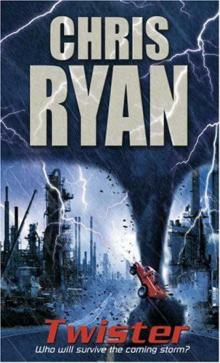 Twister cr-5
Twister cr-5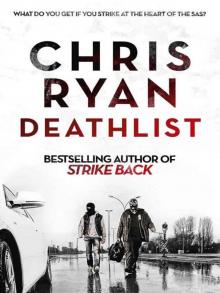 Deathlist
Deathlist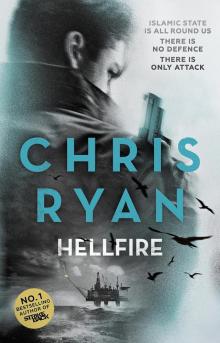 Hellfire
Hellfire Flash Flood
Flash Flood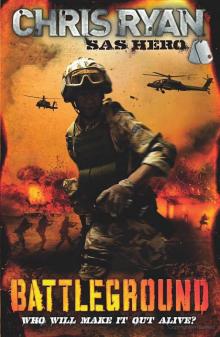 Battleground cr-6
Battleground cr-6 The Increment
The Increment